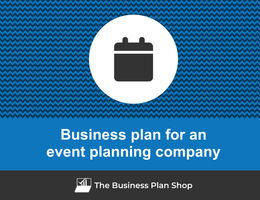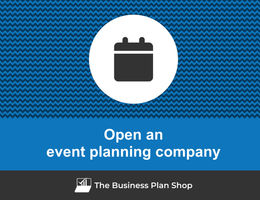How to create a financial forecast for an event planning company?

If you are serious about keeping visibility on your future cash flows, then you need to build and maintain a financial forecast for your event planning company.
Putting together an event planning company financial forecast may sound complex, but don’t worry, with the right tool, it’s easier than it looks, and The Business Plan Shop is here to guide you.
In this practical guide, we'll cover everything you need to know about building financial projections for your event planning company.
We will start by looking at why they are key, what information is needed, what a forecast looks like once completed, and what solutions you can use to create yours.
Let's dive in!
Why create and maintain a financial forecast for an event planning company?
The financial projections for your event planning company act as a financial blueprint to guide its growth with confidence and ensure its long-term financial viability.
To create them, you will need to look at your business in detail - from sales to operating costs and investments - to assess how much profit it can generate in the years to come and what will be the associated cash flows.
During challenging market conditions, maintaining an up-to-date financial forecast enables early detection of potential financial shortfalls, allowing for timely adjustments or securing financing before facing a cash crisis.
Your event planning company's financial forecast will also prove invaluable when seeking financing. Banks and investors will undoubtedly request a thorough examination of your financial figures, making precision and presentation essential.
Need a convincing business plan?
The Business Plan Shop makes it easy to create a financial forecast to assess the potential profitability of your projects, and write a business plan that’ll wow investors.

What information is needed to build an event planning company financial forecast?
The quality of your inputs is key when it comes to financial modelling: no matter how good the model is, if your inputs are off, so will the forecast.
If you are building a financial plan to start an event planning company, you will need to have done your market research and have a clear picture of your sales and marketing strategies so that you can project revenues with confidence.
You will also need to have a clear idea of what resources will be required to operate the event planning company on a daily basis, and to have done your research with regard to the equipment needed to launch your venture (see further down this guide).
If you are creating a financial forecast of an existing event planning company, things are usually simpler as you will be able to use your historical accounting data as a budgeting base, and complement that with your team’s view on what lies ahead for the years to come.
Let's now zoom in on what will go in your event planning company's financial forecast.
The sales forecast for an event planning company
From experience, it usually makes sense to start your event planning company's financial projection with the revenues forecast.
The inputs used to forecast your sales will include the historical trading data of your event planning company (which can be used as a starting point for existing businesses) and the data collected in your market research (which both new ventures and existing businesses need to project their sales forward).
Your event planning company's sales forecast can be broken down into two key estimates:
- The average price
- The number of monthly transactions
To assess these variables accurately, you will need to consider the following factors:
- Seasonal Demand: As an event planning company, you may experience fluctuations in demand based on the time of year. For example, you may see an increase in demand for weddings and outdoor events during the summer months, but a decrease in demand for corporate events during holiday seasons.
- Economic Factors: The state of the economy can also impact your average price and number of monthly transactions. During a recession, clients may be more budget-conscious, leading to lower average prices and fewer transactions. Conversely, during a booming economy, clients may be willing to spend more, resulting in higher average prices and more transactions.
- Competition: The level of competition in your area can also affect your average price and number of monthly transactions. If you are in a highly competitive market, you may need to lower your prices to remain competitive, which could result in lower average prices. On the other hand, if you are the only event planning company in your area, you may be able to charge higher prices and attract more clients.
- Event Trends: The current trends in the event planning industry can also impact your business. For example, if there is a trend towards more elaborate and extravagant events, your average price may increase as clients are willing to pay for these services. However, if there is a trend towards simpler and more budget-friendly events, your average price may decrease.
- Referral and Repeat Business: The number of referrals and repeat business you receive can also affect your average price and number of monthly transactions. If you have a strong reputation and satisfied clients, you may receive more referrals, leading to an increase in transactions. Additionally, repeat business from satisfied clients can also contribute to your monthly transactions and potentially increase your average price as they trust your services.
Once you have a sales forecast in place, the next step will be to work on your overhead budget. Let’s have a look at that now.
Need a convincing business plan?
The Business Plan Shop makes it easy to create a financial forecast to assess the potential profitability of your projects, and write a business plan that’ll wow investors.

The operating expenses for an event planning company
Once you know what level of sales you can expect, you can start budgeting the expenses required to operate your event planning company on a daily basis.
Expenses normally vary based on how much revenue you anticipate (which is why, from experience, it is always better to start your forecast with the topline projection), and where your business is based.
Operating expenses for an event planning company will include some of the following items:
- Staff Costs: This includes salaries, benefits, and training costs for your event planning team.
- Accountancy Fees: You may need to hire an accountant to help with financial management, tax preparation, and other financial tasks.
- Insurance Costs: It's important to have insurance coverage for your event planning company to protect against any potential risks or liabilities.
- Software Licences: You may need to purchase software for event management, project management, and other administrative tasks.
- Banking Fees: This includes fees for maintaining business bank accounts, processing transactions, and using online banking services.
- Marketing and Advertising Costs: You'll need to promote your event planning services through various channels such as social media, print ads, and event sponsorships.
- Office Rent and Utilities: This includes the cost of renting office space, as well as utility bills such as electricity, internet, and phone services.
- Travel and Transportation Expenses: You may need to travel for meetings with clients, site visits, and attending events, so it's important to budget for transportation costs.
- Event Supplies and Materials: This includes items such as name tags, signage, decorations, and other materials needed for events.
- Catering and Food Costs: If you offer catering services for events, you'll need to budget for food, beverages, and any other catering supplies.
- Professional Memberships and Subscriptions: Joining industry associations and subscribing to industry publications can help you stay updated on the latest trends and network with other event planners.
- Legal Fees: You may need to hire a lawyer to help with contract review, trademark registration, or other legal matters related to your event planning business.
- Office Supplies and Equipment: This includes items such as printers, computers, and office furniture needed for day-to-day operations.
- Training and Professional Development: It's important to continue learning and improving your skills as an event planner, so budgeting for training and professional development opportunities is essential.
- Miscellaneous Expenses: This includes any other expenses that may arise, such as unexpected repairs, client entertainment, or other business-related costs.
This list will need to be tailored to the specificities of your event planning company, but should offer a good starting point for your budget.
What investments are needed to start or grow an event planning company?
Your event planning company financial forecast will also need to include the capital expenditures (aka investments in plain English) and initial working capital items required for the creation or development of your business.
For an event planning company, these could include:
- Event Decor and Equipment: This includes items such as tables, chairs, linens, lighting, and decorations that are essential for creating a visually appealing and functional event space. These items are typically purchased or leased and can be used for multiple events.
- Audio Visual Equipment: In today's event industry, audio visual equipment is a must-have for creating an engaging and immersive experience for attendees. This includes items such as projectors, screens, sound systems, and microphones. These items can be purchased or rented, depending on your budget and event needs.
- Transportation: Depending on the type of events you plan, you may need to invest in transportation assets such as vans, trucks, or even a company car. These assets can be used to transport event equipment, staff, and clients to and from event venues.
- Software and Technology: In today's digital age, event planning companies rely heavily on software and technology to streamline processes and enhance the overall event experience. This may include event management software, project management tools, and communication platforms. These assets are essential for efficient and successful event planning.
- Event Inventory and Supplies: In addition to larger items, event planning companies need to invest in smaller items such as event signage, registration materials, and other supplies that are necessary for executing an event. These items may seem small, but they can add up and should be budgeted for in your expenditure forecast.
Again, this list will need to be adjusted according to the size and ambitions of your event planning company.
Need a convincing business plan?
The Business Plan Shop makes it easy to create a financial forecast to assess the potential profitability of your projects, and write a business plan that’ll wow investors.

The financing plan of your event planning company
The next step in the creation of your financial forecast for your event planning company is to think about how you might finance your business.
You will have to assess how much capital will come from shareholders (equity) and how much can be secured through banks.
Bank loans will have to be modelled so that you can separate the interest expenses from the repayments of principal, and include all this data in your forecast.
Issuing share capital and obtaining a bank loan are two of the most common ways that entrepreneurs finance their businesses.
What tables compose the financial plan for an event planning company?
Now let's have a look at the main output tables of your event planning company's financial forecast.
The forecasted profit & loss statement
The profit & loss forecast gives you a clear picture of your business’ expected growth over the first three to five years, and whether it’s likely to be profitable or not.
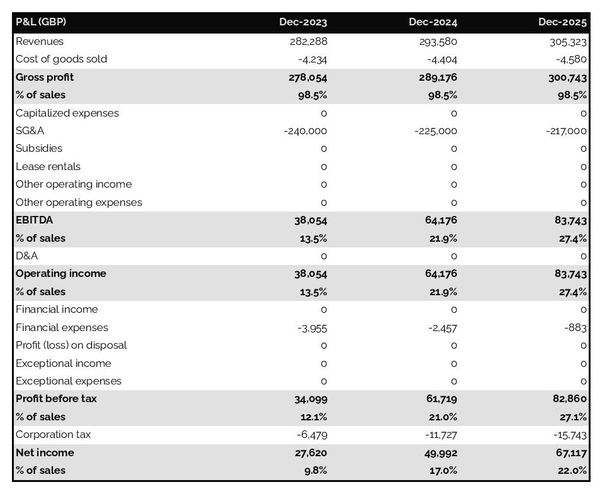
A healthy event planning company's P&L statement should show:
- Sales growing at (minimum) or above (better) inflation
- Stable (minimum) or expanding (better) profit margins
- A healthy level of net profitability
This will of course depend on the stage of your business: numbers for an established event planning company will look different than for a startup.
The projected balance sheet
Your event planning company's projected balance sheet provides a snapshot of your business’s financial position at year-end.
It is composed of three types of elements: assets, liabilities and equity:
- Assets: represent what the business possesses including cash, equipment, and accounts receivable (money owed by clients).
- Liabilities: represent funds advanced to the business by lenders and other creditors. They include accounts payable (money owed to suppliers), taxes payable and loans from banks and financial institutions.
- Equity: is the combination of what has been invested by the business owners and the cumulative profits and losses generated by the business to date (which are called retained earnings). Equity is a proxy for the value of the owner's stake in the business.
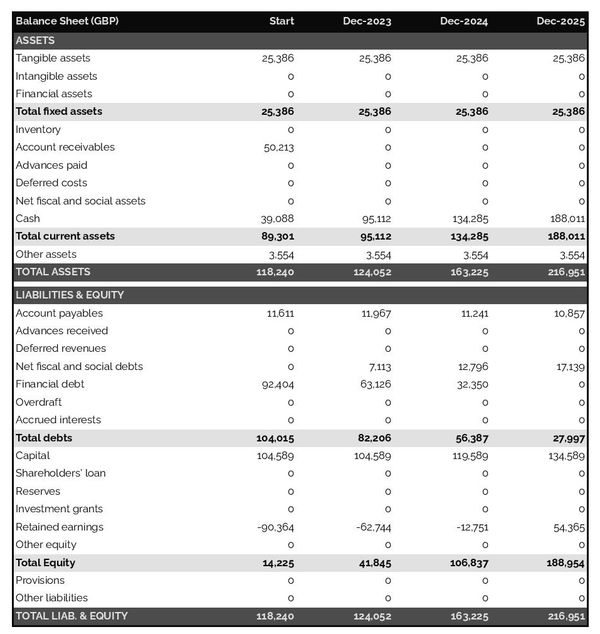
The projected cash flow statement
A projected cash flow statement for an event planning company is used to show how much cash the business is generating or consuming.
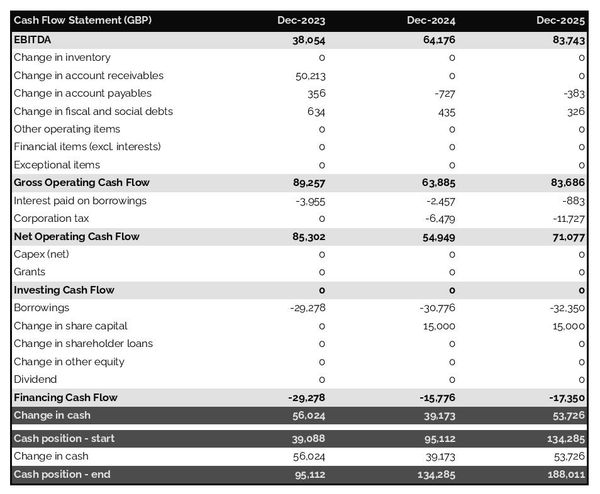
The cash flow forecast is usually organised by nature to show three key metrics:
- The operating cash flow: do the core business activities generate or consume cash?
- The investing cash flow: how much is the business investing in long-term assets (this is usually compared to the level of fixed assets on the balance sheet to assess whether the business is regularly maintaining and renewing its equipment)?
- The financing cash flow: is the business raising new financing or repaying financiers (debt repayment, dividends)?
Cash is king and keeping an eye on future cash flows is imperative for running a successful business. Therefore, you should pay close attention to your event planning company's cash flow forecast.
If you are trying to secure financing, note that it is customary to provide both yearly and monthly cash flow forecasts in a financial plan - so that the reader can analyze seasonal variation and ensure the event planning company is appropriately capitalised.
Need a convincing business plan?
The Business Plan Shop makes it easy to create a financial forecast to assess the potential profitability of your projects, and write a business plan that’ll wow investors.

Which tool should you use to create your event planning company's financial forecast?
Using the right tool or solution will make the creation of your event planning company's financial forecast much easier than it sounds. Let’s explore the main options.
Using online financial forecasting software to build your event planning company's projections
The modern and easiest way is to use an online financial forecasting tool such as the one we offer at The Business Plan Shop.
There are several advantages to using specialised software:
- You can easily create your financial forecast by letting the software take care of the financial calculations for you without errors
- You have access to complete financial forecast templates
- You get a complete financial forecast ready to be sent to your bank or investors
- You can easily track your actual financial performance against your financial forecast, and recalibrate your forecast as the year goes by
- You can create scenarios to stress test your forecast's main assumptions
- You can easily update your forecast as time goes by to maintain visibility on future cash flows
- You have a friendly support team on standby to assist you when you are stuck
- It’s cost-efficient and much cheaper than using an accountant or consultant (see below)
If you are interested in this type of solution, you can try our projection software for free by signing up here.
Calling in a financial consultant or chartered accountant
Enlisting the help of a consultant or accountant is also a good way to obtain a professional event planning company financial forecast.
The downside of this solution is its cost. From experience, obtaining a simple financial forecast over three years (including a balance sheet, income statement, and cash flow statement) is likely to cost a minimum of £700 or $1,000.
The indicative cost above, is for a small business, and a forecast is done as a one-shot exercise. Using a consultant or accountant to track your actuals vs. forecast and to keep your financial projections up to date on a monthly or quarterly basis will cost a lot more.
If you opt for this solution, make sure your accountant has in-depth knowledge of your industry, so that they may challenge your figures and offer insights (as opposed to just taking your assumptions at face value to create the forecast).
Why not use a spreadsheet such as Excel or Google Sheets to build your event planning company's financial forecast?
Creating an accurate and error-free event planning company financial forecast with a spreadsheet is very technical and requires a deep knowledge of accounting and an understanding of financial modelling.
Very few business owners are financially savvy enough to be able to build a forecast themselves on Excel without making mistakes.
Lenders and investors know this, which is why forecasts created on Excel by the business owner are often frowned upon.
Having numbers one can trust is key when it comes to financial forecasting and to that end using software is much safer.
Using financial forecasting software is also faster than using a spreadsheet, and, with the rise of artificial intelligence, software is also becoming smarter at helping us analyse the numbers to make smarter decisions.
Finally, like everything with spreadsheets, tracking actuals vs. forecasts and keeping your projections up to date as the year progresses is manual, tedious, and error-prone. Whereas financial projection software like The Business Plan Shop is built for this.
Need a convincing business plan?
The Business Plan Shop makes it easy to create a financial forecast to assess the potential profitability of your projects, and write a business plan that’ll wow investors.

Use our financial projection templates for inspiration
The Business Plan Shop has dozens of financial forecasting templates available.
Our examples contain both the financial forecast, and a written business plan which presents, in detail, the company, the team, the strategy, and the medium-term objectives.
Whether you are just starting out or already have your own event planning company, looking at our template is always a good way to get ideas on how to model financial items and what to write when creating a business plan to secure funding.
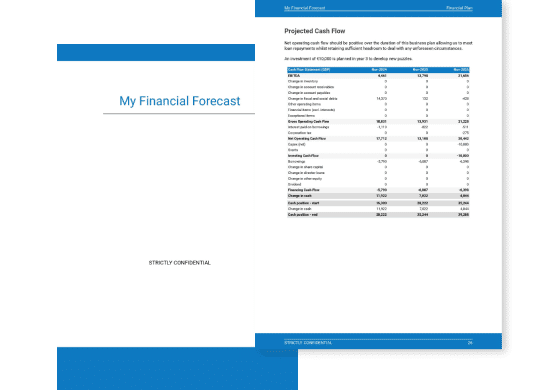
Takeaways
- A financial projection shows expected growth, profitability, and cash generation for your business over the next three to five years.
- Tracking actuals vs. forecast and keeping your financial forecast up-to-date is the only way to maintain visibility on future cash flows.
- Using financial forecasting software makes it easy to create and maintain up-to-date projections for your event planning company.
You have reached the end of our guide. We hope you now have a better understanding of how to create a financial forecast for an event planning company. Don't hesitate to contact our team if you have any questions or want to share your experience building forecasts!
Need a convincing business plan?
The Business Plan Shop makes it easy to create a financial forecast to assess the potential profitability of your projects, and write a business plan that’ll wow investors.

Also on The Business Plan Shop
- Example of financial projections
- How to create a sales forecast for a business?
- Financial forecast for a business idea
Know someone who runs or wants to start an event planning company? Share our financial projection guide with them!


